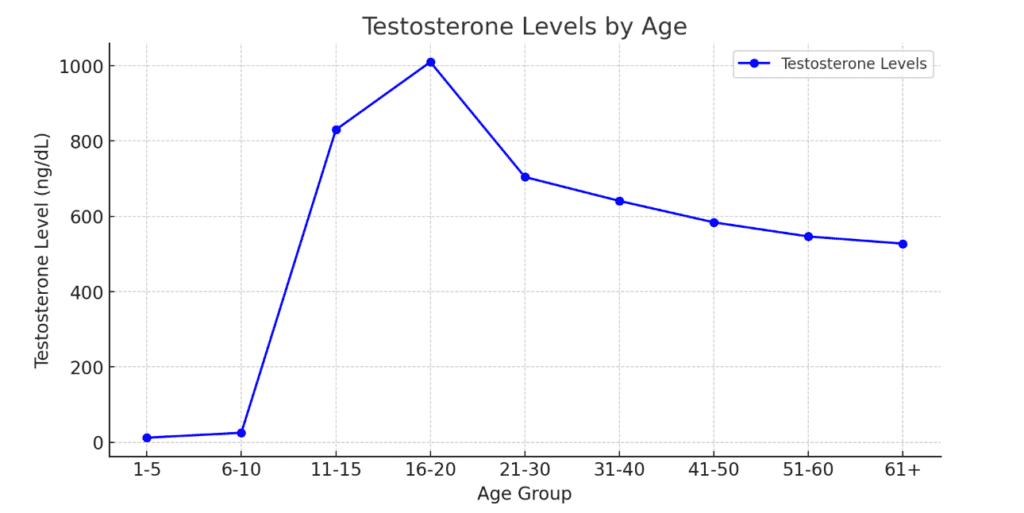Testosterone is one of the most important sex hormones in the human body, yet it remains one of the most misunderstood. This misconstrued hormone affects muscle mass, bone density, mood, and energy levels in both men and women, extending far beyond its commonly recognized role in male sex drive and performance.
Many myths about testosterone persist among people seeking to boost their health. These misconceptions often lead to poor treatment decisions, unnecessary worry, or legitimate, undiagnosed health conditions. From beliefs about aging and athletic performance to faulty information about testosterone replacement therapy, misinformation continues to spread.
Getting the facts about testosterone levels is a must for making informed health decisions. Today’s article examines the most common myths surrounding testosterone and presents the reality based on current medical research and clinical experience.
Myth #1: Testosterone Only Affects Sex Drive in Men
The Myth: Low testosterone only impacts libido and sexual performance in men.
The Reality: While testosterone does play an important role in male sex drive, its effects extend throughout the body. Low testosterone levels can cause a wide range of symptoms, including fatigue, reduced muscle mass, increased body fat, mood changes, and decreased bone density (Harvard Health).
Men with low levels may experience decreased motivation, irritability, and even depression. The hormone affects cognitive function, including memory and concentration. Testosterone also plays a crucial role in maintaining muscle mass and strength, making muscle loss a common symptom of deficiency.
Women also need testosterone for proper health. Though women produce much lower levels than men, this sex hormone is essential for maintaining bone health, muscle mass, and libido. Low testosterone in women can lead to fatigue, mood changes, and reduced sexual desire.
Myth #2: Low Testosterone is Just a Normal Part of Aging
The Myth: All men will naturally develop low testosterone as they get older, making it an inevitable part of aging.
The Reality: While testosterone levels do decline gradually with age—approximately 1% per year after age 30—clinically low levels are not a normal or inevitable part of aging. A condition known as male hypogonadism causes low testosterone levels, which come with a host of medical side effects (Mayo Clinic). As such, many older men maintain healthy testosterone levels throughout their lives, while younger men succumb to low T.
Studies show significant variation among men of the same age, with some maintaining robust levels well into their later years. The key difference lies between normal age-related decline and pathologically low levels that cause symptoms and health problems.
Low testosterone that causes symptoms and affects quality of life represents a treatable medical condition, not an unavoidable fate. Men experiencing symptoms should seek medical evaluation rather than accepting them as normal aging (The Cleveland Clinic).
Myth #3: Testosterone Replacement Therapy is Dangerous and Should Be Avoided

The Myth: Testosterone replacement therapy (TRT) is risky and causes serious health problems that outweigh any benefits.
The Reality: When properly monitored by qualified healthcare professionals, testosterone replacement therapy is generally safe and effective for men with clinically low levels. The benefits often outweigh the risks, particularly for patients experiencing significant symptoms (Mayo Clinic).
TRT can address symptoms like low energy, reduced libido, muscle loss, and mood changes. While side effects are possible, including increased red blood cells, potential cardiovascular considerations, and effects on fertility, these risks are manageable with proper medical supervision and monitoring.
The key to safe testosterone replacement lies in working with experienced healthcare providers who conduct regular blood tests and adjust treatment as needed. Many men successfully use TRT for years without significant complications.
Myth #4: Taking Testosterone Will Boost Fertility
The Myth: Higher testosterone levels automatically lead to better fertility and increased sperm production.
The Reality: This represents a dangerous misconception that can actually harm fertility. Exogenous testosterone, or testosterone taken from outside sources, suppresses the body’s natural hormone production through feedback mechanisms.
When men take testosterone, their bodies reduce production of luteinizing hormone (LH) and follicle-stimulating hormone (FSH), which are essential for sperm production. This leads to reduced sperm count and testicular atrophy over time (National Library of Health).
Men considering testosterone therapy who want to maintain fertility need specialized medical care. Healthcare providers may recommend alternative treatments or specific protocols that preserve reproductive function while addressing low testosterone symptoms.
Myth #5: Higher Testosterone Always Means Better Athletic Performance
The Myth: More testosterone automatically makes you stronger, faster, and more athletic.
The Reality: While testosterone plays a role in muscle development and athletic performance, the relationship is more complex than many people assume. Optimal levels matter more than maximum levels, and natural testosterone production varies widely among healthy, high-performing athletes.
Athletic performance depends on numerous factors, including training, nutrition, genetics, technique, and mental preparation. Simply having higher testosterone levels doesn’t guarantee superior performance. Some elite athletes naturally have testosterone levels at the lower end of the normal range, yet still excel in their sports (National Library of Health).
For men with clinically low levels, testosterone replacement may improve energy, muscle mass, and overall physical capacity. However, this represents restoration to normal function rather than performance enhancement beyond natural capabilities.
Myth #6: You Can Easily Boost Testosterone with Supplements and “Natural” Methods

The Myth: Over-the-counter supplements and quick fixes can significantly raise testosterone levels without medical intervention.
The Reality: Most testosterone-boosting supplements lack scientific evidence for meaningful increases in testosterone levels. While supplement companies make bold claims, research consistently shows minimal effects from most products marketed for this purpose (National Library of Medicine).
Legitimate lifestyle changes can support healthy testosterone production, including regular resistance training, maintaining a healthy weight, getting adequate sleep, managing stress, and following a nutrient-rich diet with sufficient vitamin D, zinc, and healthy fats. However, these changes typically provide modest improvements and work best for men whose levels are only slightly below optimal.
Men with significantly low testosterone levels require medical treatment, not DIY solutions. Attempting to self-treat serious deficiencies with supplements often delays proper diagnosis and treatment of underlying conditions.
Myth #7: Testosterone Makes Men Aggressive and Violent
The Myth: Higher testosterone levels cause rage, aggression, and antisocial behavior in men.
The Reality: Research reveals a much more complex relationship between testosterone and behavior than this stereotype suggests. While testosterone can influence confidence and assertiveness, it doesn’t directly cause violence or uncontrollable aggression (National Library of Medicine).
Interestingly, low testosterone may actually increase irritability, mood instability, and depression. Many men with low levels report feeling more emotionally volatile than when their levels are optimized. Properly balanced testosterone levels often improve mood and emotional stability rather than increasing aggression.
Studies of men receiving testosterone replacement therapy typically show improvements in mood, reduced irritability, and better emotional regulation. The “roid rage” phenomenon is more associated with abuse of anabolic steroids at extremely high doses rather than medically supervised testosterone therapy.
Myth #8: Women Don’t Need to Worry About Testosterone
The Myth: Testosterone is only important for men’s health and doesn’t significantly affect women.
The Reality: Women produce testosterone in their ovaries and adrenal glands, and this hormone plays crucial roles in female health. While women’s levels are much lower than men’s, testosterone is essential for maintaining bone density, muscle mass, libido, and overall energy levels.
Low testosterone in women can cause symptoms including fatigue, mood changes, decreased sex drive, and reduced muscle strength. Women may experience testosterone deficiency due to aging, certain medical conditions, or surgical removal of the ovaries (The Cleveland Clinic).
Hormonal balance is crucial for both sexes. Women experiencing symptoms of low testosterone should discuss evaluation and potential treatment options with their healthcare providers, just as men should.
The Facts: Understanding Normal Testosterone Levels

Normal testosterone levels vary significantly between individuals and change throughout the day. In adult males, normal total testosterone levels typically fall between 300 and 1,000 ng/dL, with many laboratories citing 350 ng/dL as the lower bound for normal.
Healthcare providers may also measure free testosterone, which represents the hormone not bound to proteins and therefore available for use by the body. Free testosterone can provide additional diagnostic information, particularly in men with borderline total testosterone levels.
For women, normal testosterone levels range from approximately 15 to 70 ng/dL, though this varies with age and individual factors. Levels fluctuate throughout the menstrual cycle and decline after menopause.
When to Seek Medical Help
Men and women should consider medical evaluation if they experience multiple symptoms that could indicate low testosterone, including persistent fatigue, mood changes, reduced libido, muscle loss, or decreased motivation. These symptoms can significantly impact quality of life and may indicate treatable hormonal imbalances.
Proper testing requires blood samples, typically drawn in the morning when testosterone levels peak. Healthcare providers may recommend multiple tests to confirm results and rule out other conditions that can cause similar symptoms.
Finding qualified healthcare providers experienced in hormone therapy is vital for accurate diagnosis and safe treatment. Endocrinologists, urologists, and some primary care physicians specialize in evaluating and treating hormonal conditions.
Be a Testosterone Mythbuster with Huddle Men’s Health
Understanding the facts about testosterone helps separate myth from reality in discussions about this critical hormone. Low testosterone affects many aspects of health beyond sex drive, represents a treatable medical condition rather than inevitable aging, and requires proper medical evaluation and monitoring.
Evidence-based information is crucial for making informed decisions about testosterone-related health concerns. The myths surrounding testosterone can lead to inappropriate self-treatment, delayed medical care, or unnecessary anxiety about normal variations in hormone levels.
Anyone experiencing symptoms that might indicate hormonal imbalances should consult qualified healthcare professionals for personalized evaluation and advice. Proper medical care can effectively address legitimate testosterone deficiencies while avoiding the risks associated with inappropriate use.
Ready to address your testosterone deficiencies? Contact Huddle Men’s Health to schedule an appointment and take back control of your overall health!
FAQs
What are the most common myths about testosterone in men?
Many believe low testosterone only affects sex drive, but that’s false. Low T can also cause fatigue, mood changes, muscle loss, weight gain, and bone issues. Another myth is that testosterone naturally declines with age and is inevitable. While levels decrease by about 1% after age 30, clinically low levels are not a normal part of aging.
How are normal testosterone levels defined?
In adult males, normal total testosterone levels fall between 300 and 1,000 ng/dL, with many labs citing 350 ng/dL as the lower bound. Levels fluctuate daily and decrease gradually with age, making free testosterone (unbound hormone) also useful in diagnosis.
Is testosterone replacement therapy (TRT) safe and effective?
TRT can safely restore healthy testosterone levels when monitored properly. It addresses symptoms like low energy, reduced libido, muscle loss, and mood changes. However, it’s not a cure-all; it may carry side effects like increased red blood cells, potential cardiovascular risks, and suppressed sperm production, so medical supervision is essential.
Can taking testosterone affect fertility and other hormonal functions?
Yes—exogenous testosterone can suppress natural hormone signals (LH and FSH), lowering sperm production and potentially causing testicular atrophy. It’s a common misconception that TRT boosts fertility, but without medical evaluation, it may do the opposite.
Can lifestyle changes boost testosterone levels naturally?
Absolutely. Regular resistance training, maintaining a healthy weight, adequate sleep, stress management, and a nutrient-rich diet (including vitamin D, zinc, healthy fats) can naturally support testosterone production and improve levels.




